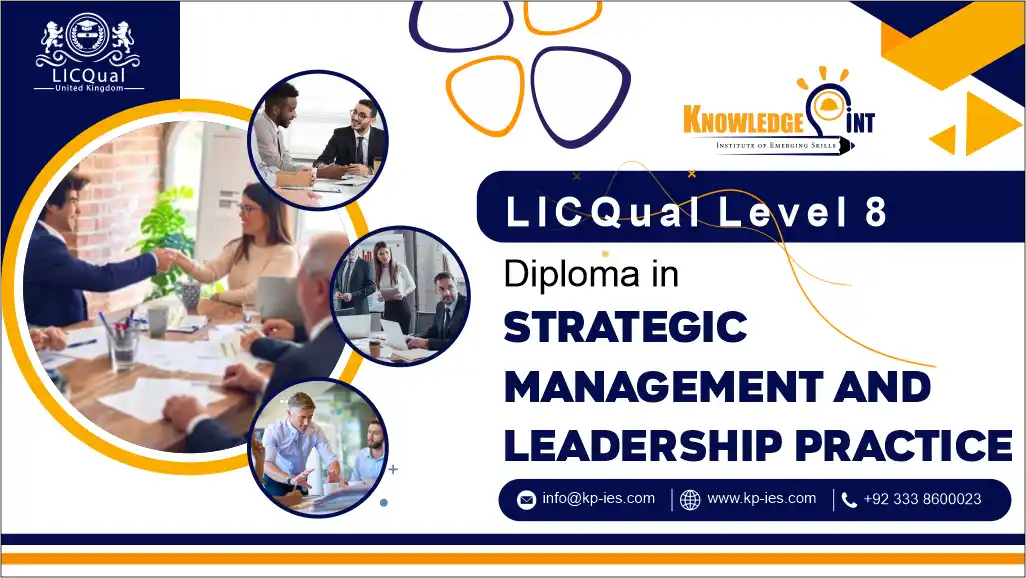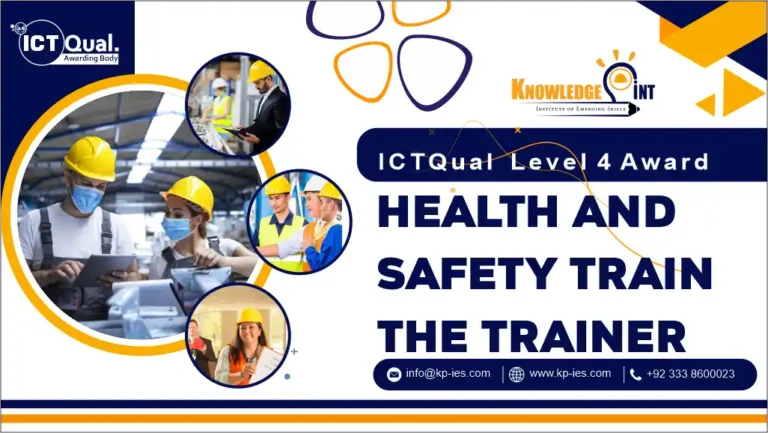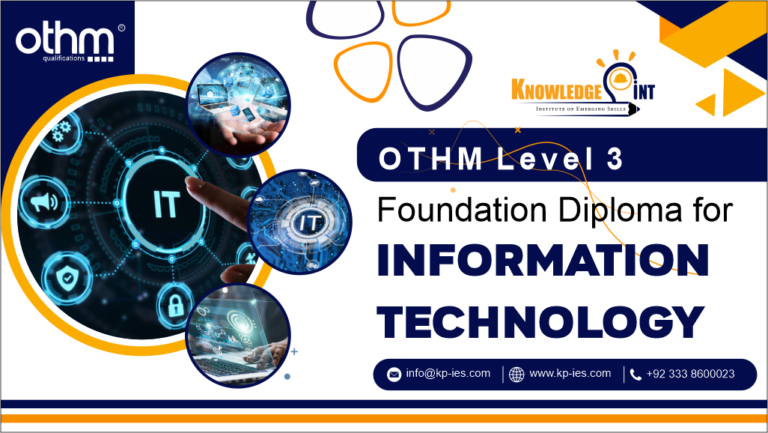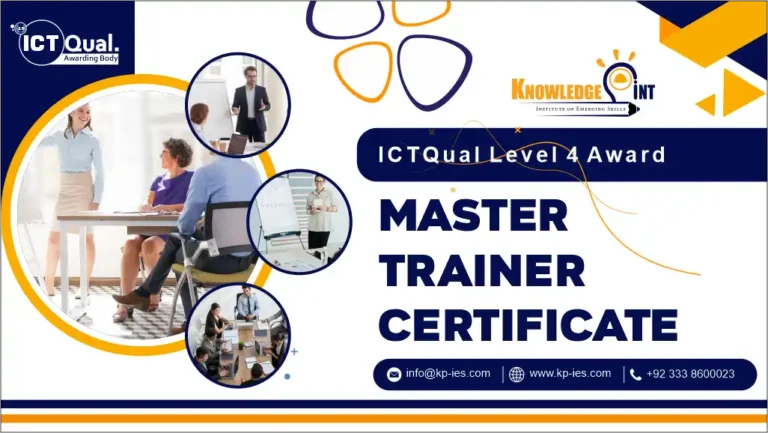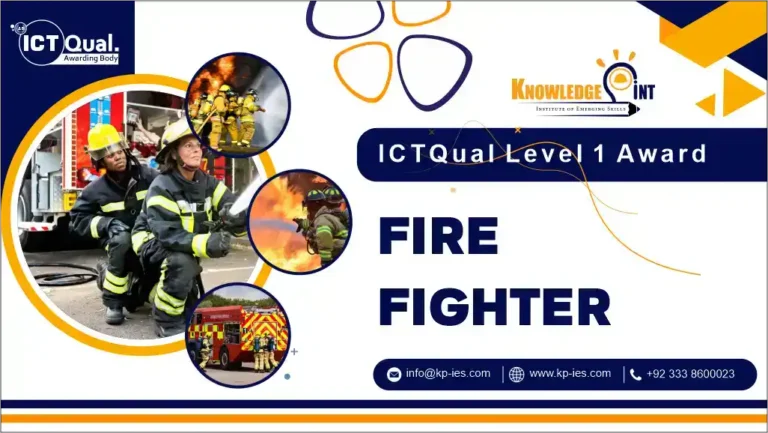In the rapidly evolving world of business, the demand for strategic leaders who can drive organizational success and navigate complex challenges has never been higher. For those seeking to sharpen their leadership skills and advance their careers, the LICQual UK Level 8 Diploma in Strategic Management and Leadership Practice offers an unparalleled opportunity. This prestigious qualification is designed for senior professionals and executives aiming to master the art of strategic management and leadership. Here’s why this diploma could be the key to unlocking your potential and achieving your career goals.
The LICQual UK Level 8 Diploma in Strategic Management and Leadership Practice is an advanced qualification aimed at senior managers and leaders who aspire to excel in strategic roles. This diploma is equivalent to a doctoral-level qualification and focuses on the development of high-level strategic and leadership skills. It’s ideal for individuals who are already in, or are aspiring to, executive positions where they need to make critical decisions and lead complex projects.
The LICQual UK Level 8 Diploma in Strategic Management and Leadership Practice is a prestigious qualification that equips senior professionals with the advanced skills and knowledge needed to excel in strategic and leadership roles. By pursuing this diploma, you’re investing in your future, gaining valuable insights into effective management practices, and positioning yourself for success in a dynamic and competitive business environment. Elevate your leadership capabilities and drive organizational excellence with the LICQual UK Level 8 Diploma your gateway to a transformative career journey.
Course Overview
The LICQual UK Level 8 Diploma in Strategic Management and Leadership Practice consists of 6 mandatory units and any 2 Optional Units which are as follows.
Mandatory Units
- Leadership Qualities and Practice
- Developing Strategic Management and Leadership Potential
- Project Development, Planning and Management
- Advanced Research Design and Methodologies
- Personal Leadership Development as a Strategic Manager
- Developing Research Capability
Optional units: Choose any TWO:
- Globalisation and Corporate Governance
- Entrepreneurship and Innovation
- Strategic Human Resource Management
- Culture and its Impact on Strategy
The future progression of the LICQual UK Level 8 Diploma in Strategic Management and Leadership Practice can lead learners towards several pathways, depending on their career goals and aspirations in the field of law and related sectors. Here are some potential avenues of progression:
Mandatory Units
- Leadership Qualities and Practice
- Identify Leadership Traits: Recognize key leadership qualities and their impact on organizational effectiveness and performance.
- Leadership Styles and Models: Evaluate different leadership styles and models, understanding how they influence team dynamics and organizational culture.
- Develop Leadership Skills: Enhance personal leadership skills, including communication, decision-making, and conflict resolution, to lead effectively in various organizational contexts.
- Developing Strategic Management and Leadership Potential
- Strategic Planning: Formulate strategic plans that align with organizational goals and adapt to changing business environments.
- Leadership Development: Identify and implement strategies to develop and enhance leadership potential within oneself and across the organization.
- Strategic Decision-Making: Apply advanced decision-making techniques to address complex business challenges and drive organizational success.
- Project Development, Planning, and Management
- Project Lifecycle Management: Understand the stages of project development from initiation to completion, including planning, execution, monitoring, and closure.
- Project Planning Techniques: Use various planning tools and techniques to create detailed project plans, manage resources, and ensure timely delivery.
- Risk Management: Identify potential risks in project management and implement strategies to mitigate and manage these risks effectively.
- Advanced Research Design and Methodologies
- Research Design: Develop comprehensive research designs, including selecting appropriate methodologies, sampling techniques, and data collection methods.
- Data Analysis: Utilize advanced data analysis techniques to interpret research findings and inform strategic decision-making.
- Research Ethics: Understand ethical considerations in conducting research and ensure adherence to ethical standards and practices.
- Personal Leadership Development as a Strategic Manager
- Self-Assessment: Conduct self-assessments to identify personal strengths and areas for improvement in leadership capabilities.
- Development Planning: Create and implement a personal development plan to enhance leadership skills and strategic management capabilities.
- Reflective Practice: Engage in reflective practice to continuously improve leadership effectiveness and adapt to evolving managerial challenges.
- Developing Research Capability
- Research Skills Enhancement: Improve research skills by learning advanced techniques for data collection, analysis, and interpretation.
- Action Research: Apply action research methodologies to address organizational issues and drive improvements based on empirical evidence.
- Research Integration: Integrate research findings into strategic management practices and decision-making processes.
Optional Units (Choose Any TWO)
- Globalisation and Corporate Governance
- Impact of Globalisation: Analyze the effects of globalisation on business operations, strategy, and competitive advantage.
- Corporate Governance Practices: Understand corporate governance principles and their role in ensuring ethical conduct and accountability in global business contexts.
- Global Governance Challenges: Address the challenges of corporate governance in multinational and cross-cultural environments.
- Entrepreneurship and Innovation
- Entrepreneurial Thinking: Develop entrepreneurial skills and mindset to foster innovation and drive business growth.
- Innovation Management: Learn techniques for managing and implementing innovative ideas and solutions within an organization.
- Business Creation: Understand the processes involved in creating and launching new ventures or business models.
- Strategic Human Resource Management
- HR Strategy Alignment: Align human resource strategies with organizational goals and business strategies to enhance performance and productivity.
- Talent Management: Implement effective talent management practices, including recruitment, development, and retention of key personnel.
- Organizational Culture: Understand the role of organizational culture in shaping HR practices and its impact on employee engagement and organizational success.
- Culture and its Impact on Strategy
- Cultural Analysis: Analyze how organizational culture affects strategic decision-making and business performance.
- Cultural Integration: Learn strategies for integrating and managing diverse cultures within an organization to enhance strategic alignment and effectiveness.
- Culture-Driven Strategy: Develop strategies that leverage organizational culture to drive competitive advantage and support strategic goals.
Course Benefits of the LICQual UK Level 8 Diploma in Strategic Management and Leadership Practice :
1. Specialized Expertise
- Auditing Proficiency: Gain specialized knowledge and skills in auditing energy management systems according to the ISO 50001:2018 standard.
- Industry Recognition: Earn a globally recognized qualification that demonstrates your proficiency as an energy management systems auditor.
2. Career Advancement
- Expanded Career Opportunities: Qualify for roles such as Lead Energy Auditor, Energy Management Consultant, or Compliance Officer.
- Higher Earning Potential: Enhance your value to employers and increase your earning potential with specialized expertise in energy management auditing.
3. Industry-Relevant Skills
- Practical Application: Acquire practical skills and techniques for planning, conducting, and documenting energy management system audits.
- Effective Communication: Develop communication skills to interact with auditees, audit teams, and stakeholders effectively.
4. Contribution to Sustainability
- Promotion of Energy Efficiency: Play a key role in promoting energy efficiency and reducing environmental impact within organizations.
- Support for Sustainable Practices: Assist organizations in implementing and maintaining energy management systems that support sustainability goals.
5. Quality Assurance
- Compliance Assurance: Help organizations achieve compliance with ISO 50001:2018 requirements and other relevant regulatory standards.
- Risk Mitigation: Identify areas of non-conformance and provide recommendations for corrective actions to mitigate risks.
6. Continuous Professional Development
- Lifelong Learning: Engage in continuous professional development by staying updated with the latest developments and trends in energy management auditing.
- Networking Opportunities: Connect with industry professionals, auditors, and experts, expanding your professional network and opportunities.
7. Organizational Benefits
- Improved Performance: Contribute to the improvement of organizational energy performance through effective auditing and recommendations for continuous improvement.
- Enhanced Reputation: Help organizations build a positive reputation for their commitment to energy management and sustainability practices.
8. Personal Growth
- Leadership Development: Develop leadership skills to effectively manage audit teams, delegate tasks, and ensure audit objectives are met.
- Confidence Boost: Gain confidence in your abilities as an energy management systems auditor through practical training and hands-on experience.
The LICQual UK Level 8 Diploma in Strategic Management and Leadership Practice is an advanced qualification designed for senior professionals and executives. Completing this diploma equips individuals with the skills and knowledge necessary to excel in high-level strategic roles. For those looking to build on their qualification and advance their careers, there are several pathways to consider:
1. Doctoral Programs
- Doctorate in Business Administration (DBA): A DBA is a research-focused degree that allows you to contribute original research to the field of business management and leadership. It is ideal for those interested in combining practical business experience with academic research.
- PhD in Management: Pursuing a PhD provides an opportunity for in-depth academic research in strategic management, leadership, or related fields. This is suitable for those aiming for a career in academia or advanced research roles.
2. Executive Education and Specialized Training
- Executive Leadership Programs: Enroll in advanced executive programs that focus on leadership development, strategic decision-making, and innovation. These programs are designed to enhance executive skills and address emerging trends in leadership.
- Specialized Certifications: Obtain certifications in areas such as digital transformation, strategic innovation, or global business management to further enhance your expertise and adapt to evolving business environments.
3. Senior Executive Roles
- Chief Executive Officer (CEO): With the advanced strategic and leadership skills gained, you may pursue roles such as CEO, where you will lead organizational strategy and drive overall business success.
- Chief Operating Officer (COO): Transition into roles like COO, responsible for overseeing daily operations and implementing strategic initiatives across the organization.
4. Consultancy and Advisory Roles
- Strategic Consultant: Leverage your expertise to provide strategic consultancy services to organizations, helping them navigate complex challenges and implement effective strategies.
- Executive Coach: Become an executive coach, using your advanced leadership knowledge to mentor and develop senior leaders and managers.
5. Entrepreneurship and Business Ownership
- Business Start-Up: Use the strategic and leadership skills acquired to start and manage your own business venture, applying advanced management practices to drive growth and innovation.
- Business Development: Engage in business development activities, identifying and pursuing new opportunities, markets, and partnerships.
6. Higher Education and Academic Careers
- Teaching and Academia: Pursue opportunities to teach at higher education institutions, sharing your knowledge and experience with the next generation of business leaders.
- Research and Publications: Contribute to academic journals and industry publications, focusing on strategic management and leadership topics, and participating in conferences and seminars.
7. Continuous Professional Development (CPD)
- Ongoing Learning: Engage in continuous professional development through workshops, seminars, and industry events to stay updated with the latest trends and developments in strategic management and leadership.
- Networking: Join professional organizations and networks to connect with other senior professionals and stay informed about industry best practices and emerging trends.
The LICQual UK Level 8 Diploma in Strategic Management and Leadership Practice provides a solid foundation for advancing your career in strategic and leadership roles. By pursuing further education, specialized training, senior executive roles, consultancy opportunities, or entrepreneurial ventures, you can continue to build on the skills and knowledge gained through this diploma. The pathways for progression are diverse and offer numerous opportunities to leverage your expertise, drive organizational success, and achieve personal career goals.

